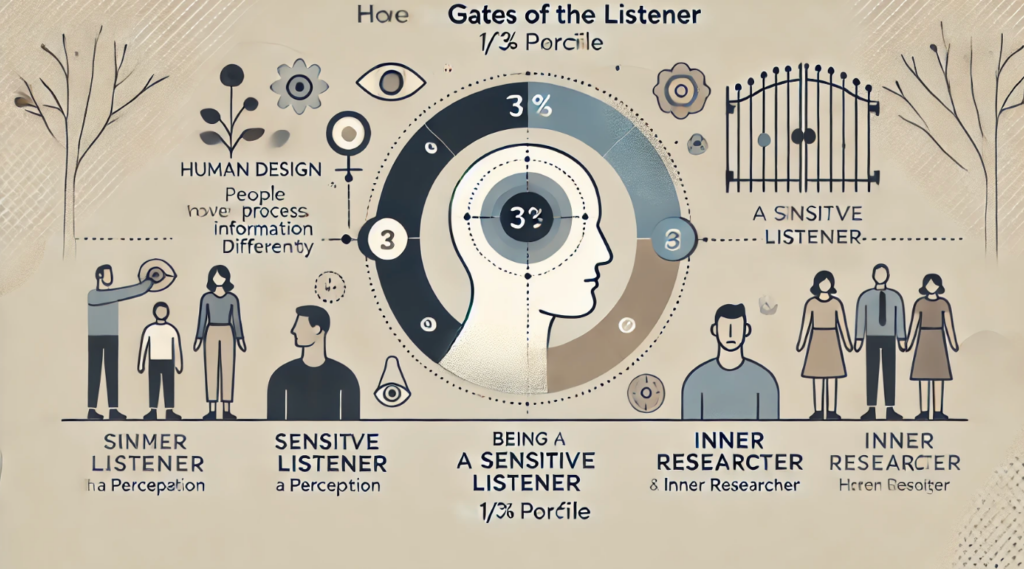Have you ever wondered why some people can grasp information just by hearing it once, while others need to try everything themselves? Or why some thrive in lively discussions, while others need solitude to fully understand? It’s not about intelligence or experience – each of us is naturally tuned to our unique channel of perceiving the world.
In Human Design, there are the Gates of the Listener, belonging to a special category – Role Gates. They don’t just show how a person perceives sounds or speech. These gates reveal your individual mechanism for understanding any information – from simple conversations to complex life situations. Their uniqueness lies in how they’re read through your profile lines, revealing the subtleties of your specific way of knowing the world.
How Natural Perception Works
Let’s look at this mechanism through a real example – profile 1/3. Here, an interesting interaction occurs: at the conscious level (first line), a person strives to be a sensitive listener, trying to grasp the essence and feel every word. But at the subconscious level (third line), an inner researcher constantly activates, needing to verify everything through personal experience.
This can create an amusing internal dialogue: “Everything seems clear and logical, but I should check…” And even if reason says “don’t experiment,” the inner researcher still pushes for verification. Sounds familiar?
Why This Matters
Understanding your natural way of processing information is like discovering you’ve been trying to write with your non-dominant hand all along. Think about how many times you’ve criticized yourself for not instantly trusting information like others do, or conversely, for being too trusting.
This shows up in all areas of life. At work, such a person carefully listens to colleagues and clients, catching all the nuances, but then inevitably needs to verify the information in practice. In personal relationships, they can deeply empathize with their partner while occasionally stepping back for critical analysis.

Real-Life Impact
At Work:
- Finally understanding why some learning formats feel natural while others seem torturous
- Stopping the struggle to conform to others’ ways of processing information
- Organizing information intake in your most comfortable way
In Relationships:
- Learning to explain your understanding process to others
- Accepting your natural need to alternate between deep empathy and analytical distance
- Building more authentic and honest connections
What’s Next?
Here’s where it gets interesting – understanding how you perceive information is just the beginning. What’s the point of knowing how you “hear” the world if you don’t know what to do with this knowledge?
This is where other Role Gates come into play. Think of the Listener Gates as your ears and ability to perceive information. But after receiving information, you need to know how to act on it – that’s where Gate 10 comes in. And sometimes you need to influence a situation – that’s where Gate 7 becomes crucial.
Moving Forward
First – accept and stop fighting your nature. Seriously, that’s half the battle. Next – start noticing how your natural way of processing information manifests in different situations. Finally – learn to use this as your superpower rather than seeing it as a limitation.
And if you want to dive deeper and learn how to use this information most effectively – look into other Role Gates in your profile. After all, perceiving information is just the first step in understanding yourself and your path.

